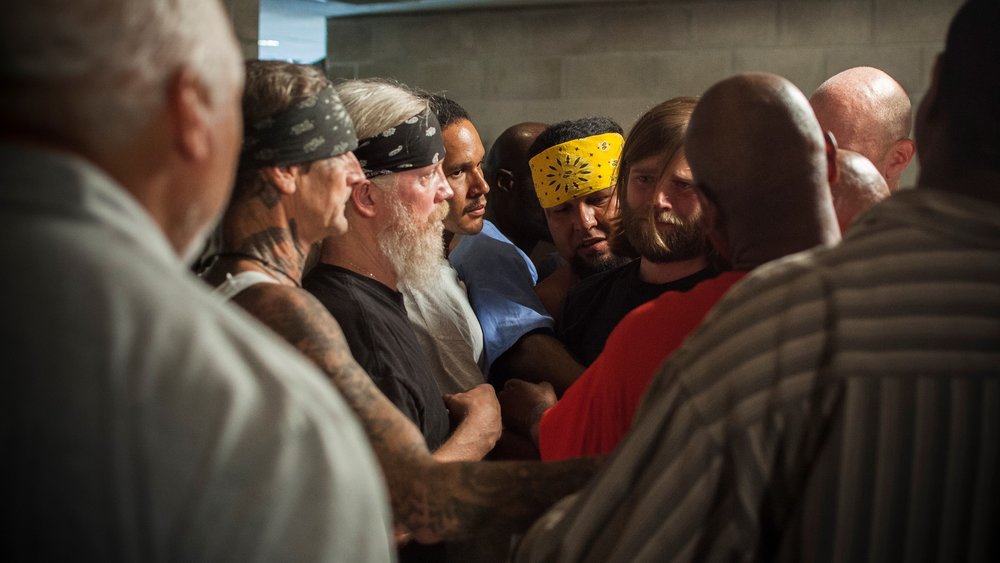
The Work, an intimate observational documentary from Jairus McLeary and Gethin Aldous, features the closest thing to real-life exorcisms you might ever see.
In a grey cinder block room in California’s Folsom State Prison, a maximum security jailhouse made famous by Johnny Cash’s blues, small pockets of men sit on fold-up chairs, unspooling their deepest, most complicated feelings. One convict is desperate to let down his guard and mourn his sister. His group form a circle and coach him on breathing and posture, as he stands silent, tense, diving inside to retrieve the pain. Something rumbles up his chest and out his mouth like an unholy furball, erupting in an animal howl of grief. The other men hold him in a scrum while he swears and sobs, convulsing like a demon’s being ripped from his body. Afterwards another prisoner congratulates him on becoming a ‘naked man’, and it’s this rare intimacy and exposure that makes The Work such an immersive watch.
The film sits in on an intensive four-day therapy session, where members of the public are invited, once a year, to join inmates for radical self-examination and communication. First-time attendees are paired up with experienced convicts who act as guides, and the room is split into circles, small groups that will spend the next four days together, working through whatever it is that has them in knots: parent and abandonment issues, resentment, suicidal thoughts, anger and depression. We follow three first-time civvies: Charles, a bartender who grew up with an absent father; Chris, a quiet, sceptical twenty-something with a vague sense of life passing him by; and Brian, a handsome young teaching assistant with a Dave Franco smirk, whose air of superior discontent masks an easily-pricked supply of rage.
The Work offers astonishing images of people just feeling things, its subjects temporarily insulated from day-to-day distractions and comforts. The possibilities of rehabilitation for the prisoners exists— a text coda notes that no inmate who went through the therapy re-offended after release — but the film spends little time on redemption tropes. The details of the often violent crimes committed by those in the room (one admits to nearly sawing a victim in half) are briefly sketched but otherwise ignored. Taking the session’s ‘all in the same boat’ inclusivity on face value, the film is less interested in personal narratives, and the value judgements they invite, than in documenting pain and transformation occurring in real time.
Breakthroughs and breakdowns come in waves and pivots. When an inmate lashes out at Brian, calling him a ‘bitch’, Brian flares up, settles down and then, suddenly, roars in frustration, his tight body tense, snot dripping from his face. ‘When I feel disrespected I just wanna kill somebody’ he spits. Throughout the four days, hard, complicated feelings trigger reactions in others, a soul-bearing domino effect. The air is thick with urgent activity, conversations pierced by out-of-shot outbursts.
If therapy is a kind of secular religion, and the charismatic programme leaders here are preachers, then what the subjects experience is a form of grace. The men resist, surrender, and find themselves surprised by transformation. The Work is light on the formal arrangements sometimes used to give documentaries context and momentum, and because of this remains compelling and cinematic. Filming talking men sitting in circles sounds passive or inert but it’s full of storytelling action. This isn’t lip-service positivity or feel-good fixes. It’s a painful process of movement and change, registered in tight lips, squeezed palms and hesitant, unsure speech. It’s hard work, and often hard watching. Conor Smyth
The Work is screening at Queen’s Film Theatre, Belfast until Wednesday 27th September.





